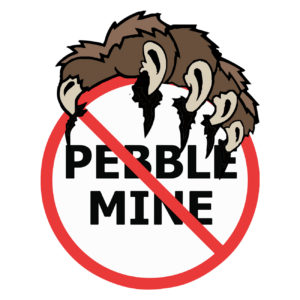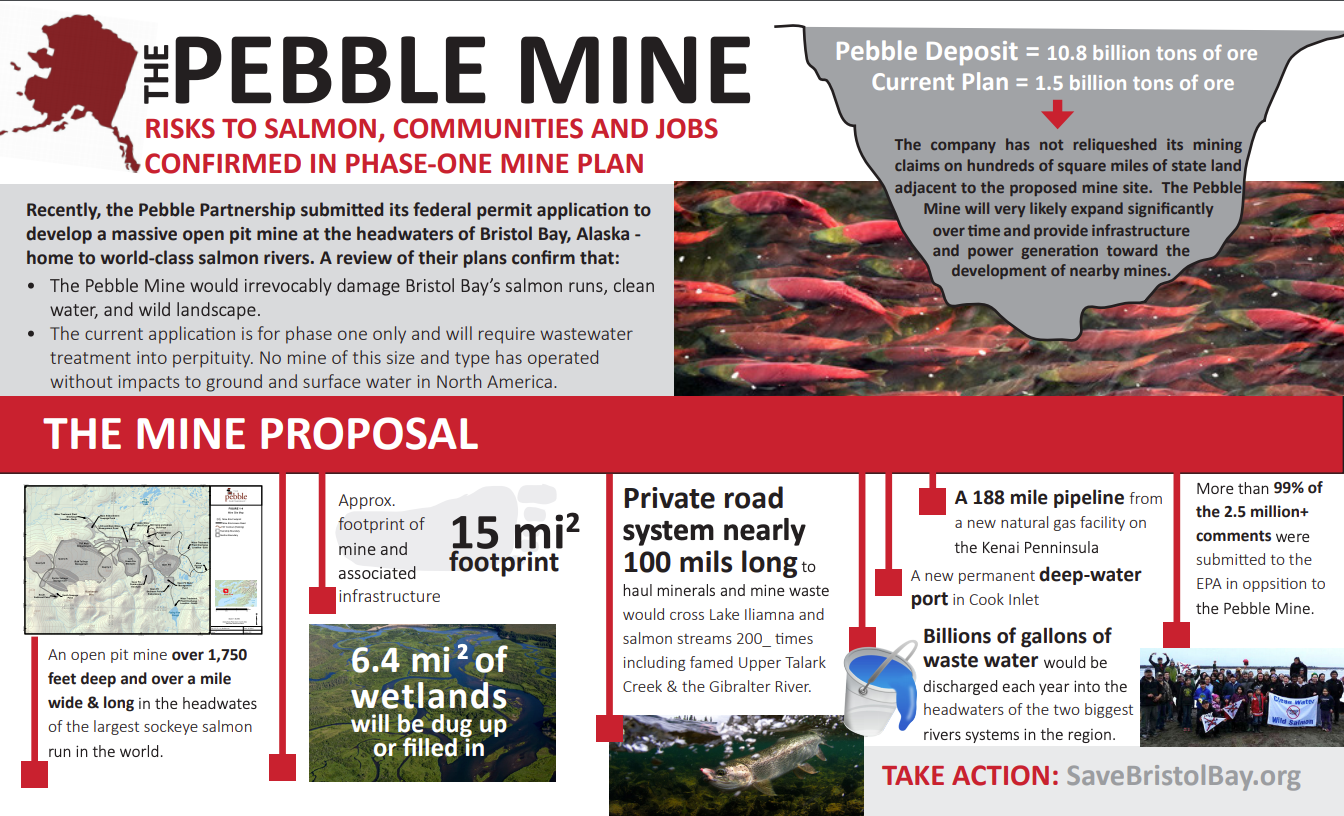
Update: January 31, 2023 – click here.
The Pebble Mine has the potential to permanently and irreversibly damage the salmon runs on which the bears of the Alaska Peninsula rely.
The current proposal for the Pebble Mine includes:
- An open pit mine 1 mile wide and a quarter-mile deep
- Destruction of over 3,000 acres of wetlands and more than 21 miles of salmon streams at the mine site itself, plus the destruction of at least an additional 1,000 acres of wetlands and impacts to hundreds of other salmon streams due to road and pipeline construction
- Construction of a massive tailings storage facility, treatment ponds, and associated dams and embankments that will block salmon streams and potentially inundate the streams with polluted water
- Construction of a private 83-mile long two lane road with more than 200 stream crossings and 8 large bridges
- Development of an ice-breaker barge system across Lake Iliamna with two lakeside terminals
- Development of a large private port facility on Cook Inlet near salmon streams and extending more than 4 miles into the inlet waters and known habitat for sea otters, beluga whales, humpback whales, and seals
- Construction and operation of a 230-megawatt power plant (with two additional 2mw plants at the port) approximately 15 miles upwind from Lake Clark National Park
- Construction of a 188 mile long natural gas pipeline over land and under the Cook Inlet and Iliamna Lake
- At closure of the mine after 20 years of intended operation, the proposal includes the backhaul of 1.1 billion tons of tailings waste into the pit, to be monitored and maintained in perpetuity.
The Pebble Mine has proposed alternate infrastructure development that would be similarly damaging.
For nearly two decades, Bristol Bay residents have vigorously opposed industrial mining that threatens the most prolific wild sockeye salmon fishery on the planet, 20,000 fishing jobs, $1.5 billion fish-based economy and vibrant Alaska native culture and traditions. Local opposition is backed by strong science that shows the proposed Pebble mine would have permanent and irreparable damage to hundreds of miles of streams and nearly 5,000 acres of wetlands, and risk catastrophic harm from a tailings facility that is uncertain to function as designed.
On November 25th, 2020, Americans across the country celebrated when the U.S. Army Corps of Engineers denied the permit for the Pebble mine. However, Pebble Partnership is pursuing an appeal of this ruling, and long-term protections are still needed for the region.
The U.S. Army Corps of Engineers rejected the proposed Pebble Mine because it was incompatible with Clean Water Act standards and public interests. While the proposed Pebble Mine will no longer receive a federal permit, the people, fish, and fish-based resources of Bristol Bay are at risk until upfront, permanent protections are put in place.
On September 9, 2021, the United States Environmental Protection Agency agreed to reverse the Trump Administration’s removal of protections for Bristol Bay under the Clean Water Act. In 2014, the EPA determined to restrict the Pebble Mine from using the Bristol Bay watershed to dispose of mine waste. The Trump Administration reversed that decision in 2019, and the EPA has agreed to reinstate the 2014 determination.
Battles have been won, but the war rages on. Until permanent protections are in place for the Bristol Bay watershed, Pebble Mine will continue to fight to develop the mine. This is what it would look like:

If you have enjoyed my recent bear photos, please watch this video regarding the proposed Pebble Mine in Alaska:
Please consider calling or writing to Gov. Dunleavy, Sen. Murkowski, and Sen. Sullivan and expressing your concern about the protection of salmon and the negative impacts of the Pebble Mine.
You can also submit written comments at this link: Take Action
If you’d like to learn more about the Pebble Mine, please visit Save Bristol Bay.
December 5, 2022 update:
In case you missed it last week, big news in the ongoing fight against the Pebble Mine. I hope you’ll read this post and forward it on to your friends who love wild places.
Last week, the US Environmental Protection Agency, Region 10, issues a recommended determination on the Pebble Mine project, which states:
“The EPA Region 10 Regional Administrator has determined that discharges of dredged or fill material for the construction and routine operation of the mine at the Pebble deposit identified in the 2020 Mine Plan would be likely to result in unacceptable adverse effects on anadromous fishery areas in the SFK and NFK watersheds. Accordingly, the Regional Administrator recommends that EPA prohibit the specification of waters of the United States within the Defined Area for Prohibition [ ] as disposal sites for the discharge of dredged or fill material for the construction and routine operation of the 2020 Mine Plan.”
Region 10 Administrator Casey Sixkiller stated in a written press release last week:
“If affirmed by EPA’s Office of Water, this action would help protect salmon fishery areas that support world-class commercial and recreational fisheries and that have sustained Alaska Native communities for thousands of years, supporting a subsistence-based way of life for one of the last intact wild salmon-based cultures in the world.”
Put simply, the recommendation from Region 10 is to completely prohibit Pebble Mine from using an area immediately surrounding the proposed mine site for discharging waste from the proposed mine. This could well kill Pebble Mine if the recommendation is adopted as the final determination.
The next step is for the EPA’s assistant administrator for water, Radhika Fox, to review the recommendation and the administrative record supporting the recommendation. This administrative record included MORE THAN 1 MILLION COMMENTS opposing the Pebble Mine and supporting the EPA’s proposed determination to protect the watershed surrounding the Pebble Mine site.
If you were one of the people who submitted comments opposing Pebble Mine, thank you. We’re closer than we have ever been to putting Pebble Mine into the history books as a close call and not as a retrospective regret.
But the fight is not over until it’s over. Like the salmon in this photo, Pebble Mine will twist and gyrate any way it can to avoid losing. Peter Thiessen, Pebble’s CEO, said last week, “The EPA has made wildly speculative claims about possible adverse impacts from Pebble’s development that are not supported by any defensible data.”
Pebble will not go away quietly, so it is important to keep on top of this fight until it’s truly over. Stay tuned.
January 31, 2023 update:
FINALLY!
The long fight against the wrong mine in the wrong place has reached a milestone that spells doom for the Pebble Mine. Today, the US Environmental Protection Agency issued its Final Determination under the Clean Water Act. The Final Determination results in a resounding “NO” to Pebble Mine.
From EPA Assistant Administrator of Water Radhika Fox:
“After reviewing the extensive scientific and technical record spanning two decades, EPA has determined that specific discharges associated with developing the Pebble deposit will have unacceptable and adverse effects on certain salmon fishery areas in the Bristol Bay watershed. Our Final Determination helps prevent those adverse effects while helping protect a vibrant and magnificent watershed.”
Today’s action marks the third time in 30 years, and only the 14th time in the history of the Clean Water Act, that EPA has used this authority. This highlights the value of the Bristol Bay watershed’s fishery resources.
A copy of the Final Determination is available on EPA’s Bristol Bay website at: www.epa.gov/bristolbay
